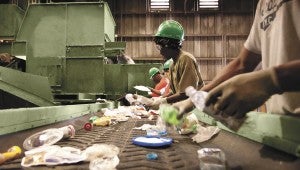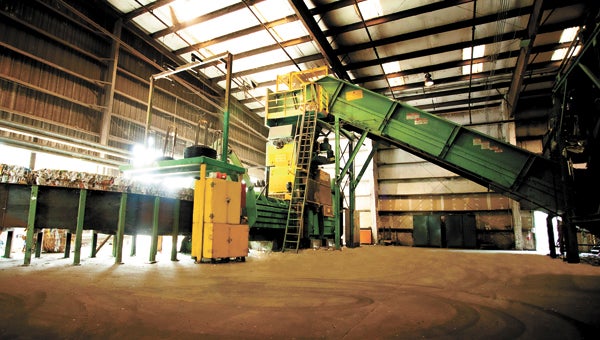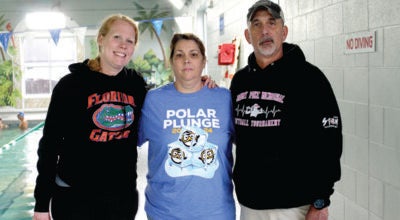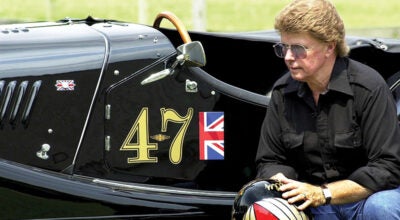Second time around
Published 8:14 pm Tuesday, March 17, 2015
Company’s recycling efforts go back to 1897
A common objection to recycling is that it’s “just a fad,” but the history of TFC Recycling shows that couldn’t be further from the truth.
The Benedetto family’s history in America goes back to 1897, when the family immigrated to New York from Italy.
The family started collecting rags and newspaper, baling it and finding a buyer for it to make money.
“The money that they made off of recycling those items — they sent the money back to Italy to bring family to America,” said Kristi Rines, marketing and events manager for TFC Recycling. “It’s really a neat little story.”

Employees at TFC Recycling sort items on a conveyor belt. A combination of humans and machinery separate the many different types of recyclables into groups so they can be baled and sold. (Submitted Photo)
Joe Benedetto decided he wanted to go his own way, so he left New York and started TFC Recycling in Hampton Roads in 1973. His family’s business still operates in New York, as well.
TFC Recycling now collects recycling from more than half a million homes in Hampton Roads (including Suffolk) and the Richmond area. But a lot has changed since 1897.
“Aluminum, tin, plastic bottles, paper, those items have remained recyclable for years and years,” Rines said. “The processing technology has changed.”
Rather than just collect rags and bale them, as the Benedetto family did early on, the recyclables now collected are transported to TFC facilities, including one in Chesapeake, where a series of humans and mechanisms separates the recyclable materials into their different types.
The material is then baled and sold back into the recycling stream, where it will come out on the other end as a new product.
Aluminum, glass and paper usually are turned back into the same thing, sometimes within 30 days (for glass) to 60 days (for aluminum cans). Paper can be recycled up to seven times before fresh pulp needs to be added, Rines said.
But plastic can get changed into a lot of things, from carpet to the filling that completes everything from coats to stuffed animals.
“It’s amazing when you see the process,” Rines said.
Not only does recycling prevent materials from going to the landfill but also it creates more jobs, Rines said.
“It takes more people,” she said. “If everything went to a landfill, you just bury it and keep an eye on it for 50 years. It only takes one guy to keep an eye on it. There’s way more jobs in recycling than there ever were in trash.”
Ever mindful of the finite amount of landfill space available to localities, trash haulers have started “mining” recyclables from the trash stream, Rines said.
But even that extreme step can’t stop one of the biggest misconceptions about recycling — that it merely goes to the landfill anyway.
“I’ve had wives drag husbands over to us and say, ‘Tell him that it doesn’t go to the landfill,’” Rines said. “It takes a lot of effort for us to go to collect somebody’s can of recyclables, so it’s not in our interest to take it to a landfill when it’s all said and done.”
Clearing up another point of confusion, Rines said food scraps, grease, oil and other contaminants are best kept out of the recycling stream as much as possible.
“We’re trying to educate everybody on keeping that system as clean as you can keep it,” Rines said. “We understand that people don’t want to get every scrape of peanut butter out of a jar. In some ways, that’s wasting water, so you don’t want to do that, but as much as you can, the better it is for us to be able to find a buyer.”
So what can I recycle through TFC Recycling?
Tin cans
“Even tin foil, as long as it doesn’t have food contamination on it,” is recyclable, said Kristi Rines of TFC Recycling.
Aluminum cans, like soda or beer cans
“Aluminum cans almost always turn back into aluminum cans,” Rines said. “They have a 60-day turnaround. Once you put it in your curbside container, it’s sorted, baled and shipped, and it’s back on the store shelf within 60 days as a new aluminum can.”
Plastic bottles Nos. 1 and 2
“The idea is if it has a neck, that’s what you look for,” Rines said. Even shampoo bottles and colored plastics like detergent bottles are recyclable. But as much of the original contents should be out of the bottle as possible to prevent contamination. Contamination is also the reason motor oil bottles, even though they’re made from the same plastic, are not recyclable.
Newspaper, mixed paper, cardboard boxes like those cereal and other processed foods come in, and larger cardboard boxes
“It’s kind of yes and no,” Rines said about whether pizza boxes are recyclable. The grease usually contaminates the box, but you can separate the top from the bottom and put the top in the recycling bin while the bottom goes in the trash. Some pizzerias use liners on the bottom, and that can prevent grease from getting on the bottom as well, making it recyclable.
Glass bottles
“We’re the only recycler (in this area) that gets our glass recycled,” Rines said. “Other recyclers don’t have that. Their glass gets used for landfill cover or road base, but ours actually gets turned into new glass bottles.”
What can’t I recycle through TFC Recycling?
Sharps and syringes
It may seem obvious, but some websites give the advice to put used medical syringes into thicker plastic bottles, such as detergent bottles, and dispose of the bottle. But Rines said some people think they can recycle it that way since they would ordinarily recycle the bottle. “They end up on our recycling lines, and they become a health hazard for our workers,” Rines said. “That’s not the place to dispose of them. They need to go in a trash container or get a medical box and have a service that will collect that from their homes.”
Plastic bags
They can be recycled at the grocery store, but not through TFC’s system. “Plastic bags are horrible for our machinery,” Rines said.
Clothing
Even if it has holes in it, try taking it to Goodwill, Rines said. Even if they can’t sell it, they can bale all their un-sellable textiles together and sell it to make money for their employment programs, Rines said.
Electronics
These also can go to Goodwill, which might be able to refurbish them if they’re broken. The city of Suffolk has recycling events several times per year where electronics are accepted.







